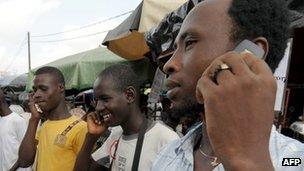Africa's mobile phone industry 'booming'
- Published

More than 95% of mobile phone subscriptions in Africa are pre-paid
Africa is the fastest-growing mobile market in the world, and is the biggest after Asia, an association of worldwide mobile phone operators has said.
The number of subscribers on the continent has grown almost 20% each year for the past five years, the GSM Association report on Africa says.
It expects there will be more than 735 million subscribers by the end of 2012.
Analysts say bad and expensive landline connections in Africa are responsible for the high mobile phone usage.
Peter Lyons, GSMA's director of spectrum policy for Africa and Middle East, told the BBC that mobile penetration in Africa had reached 649 million subscribers in the fourth quarter of 2011.
Tax cuts
"That is equivalent to a 65% penetration rate. Out of every 100 people, 65 have some form of mobile connectivity," he told the BBC's Focus on Africa programme.
In a report, GSMA says that 96% of subscriptions, external are pre-paid with voice services currently dominating, although uptake of data services is increasing steadily.
The Kenyan government's abolition of the 16% general sales tax on mobile handsets in 2009 has resulted in handset purchases increasing by more than 200%, it says.
Kenya is at the forefront of mobile money transfers, with 8.5 million users, the report says.
Nigeria has the highest number of mobile phone subscriptions in Africa - more than 93 million, representing 16% of the continent's total mobile subscriptions, GSMA says.
South Africa, with its more developed infrastructure, has the highest broadband penetration - 6%, followed by Morocco with 2.8%, the report says.
"The mobile industry in Africa is booming and a catalyst for immense growth, but there is scope for far greater development," Mr Lyons said.
He said 36% of people in the 25 largest African mobile markets still had no access to mobile services.
"To take full advantage of its potential, African countries need to allocate more spectrum for the provision of mobile broadband services, as well as introduce tax cuts for the industry," Mr Lyons said.
The report says African countries have allocated far less spectrum to mobile services than Europe, the Americas and Asia, which inhibits connectivity to many people in rural areas.
"Sufficient spectrum should be provided for mobile broadband services through 3G, HSPA [High-Speed Packet Access] and LTE [Long Term Evolution] technologies," it says.
- Published29 September 2011
- Published22 November 2010
- Published16 June 2011